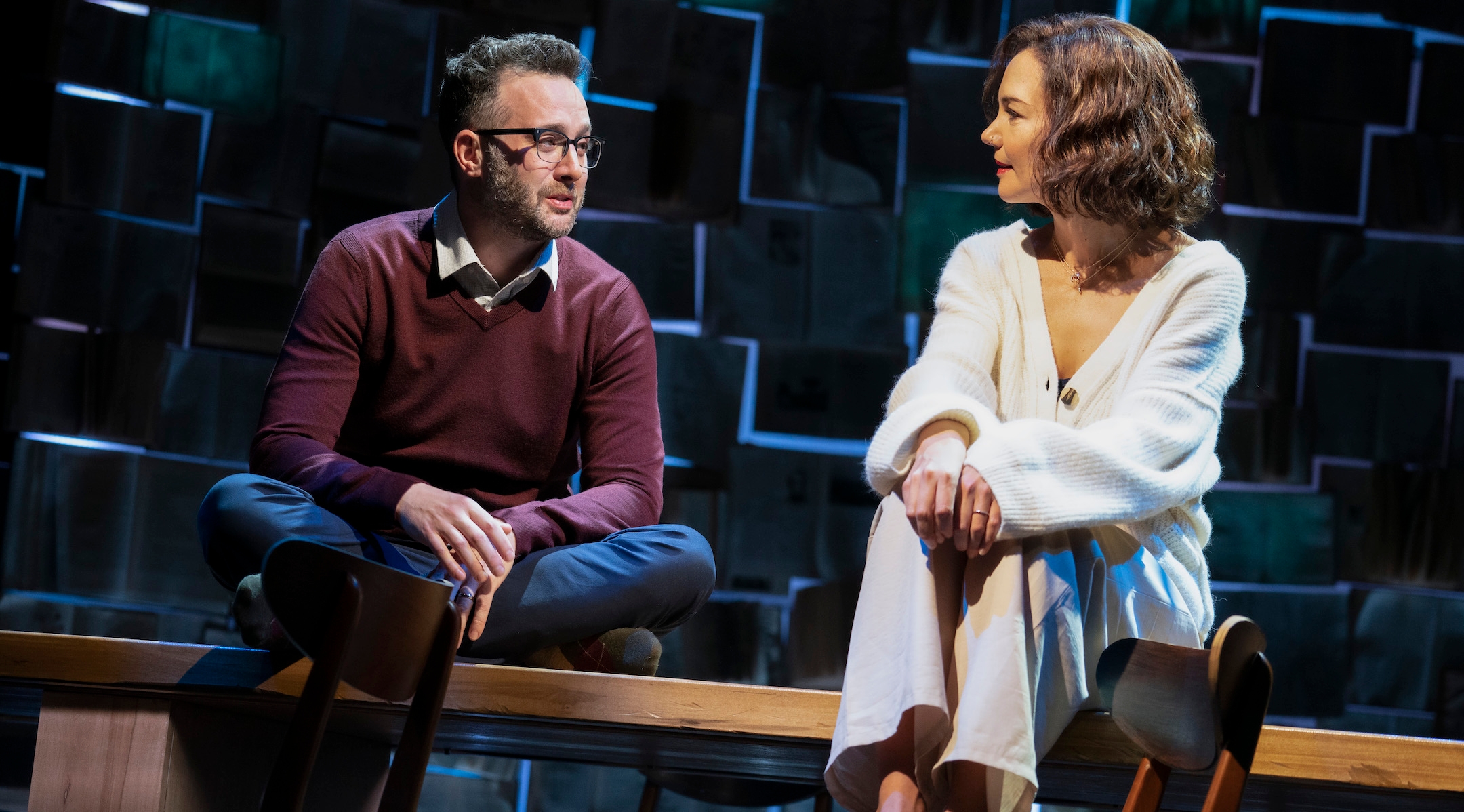(New York Jewish Week) — When Jewish literary power couple Jonathan Safran Foer and Nicole Krauss divorced in 2014 — amid rumors that he was in love with his longtime friend Natalie Portman — it captivated the nation.
Well, maybe not the nation, but certainly the literary and media worlds, as well as the hipster set in brownstone Brooklyn. Safran Foer and Krauss were rare literary megastars, whose “extremely loud and incredibly expensive” Park Slope brownstone was the subject of numerous articles (and a hefty dose of envy) when it hit the market for $14.5 million in 2013.
Portman, of course, was an actual megastar, and when the confessional correspondence between the celebrated actress and the “Everything Is Illuminated” writer was later published in 2016 in the New York Times, it elicited a fresh round of jealousy, speculation and eye-rolls from the masses, as well as numerous journalistic “takes” on the topic.
I was a teenager at the time, and had only a vague idea of why any of this mattered. But apparently it stayed with me for nearly a decade, because when I saw “The Wanderers,” a new Off-Broadway play running at the Roundabout Theatre Company, it didn’t take long for me to make the connection between this fictional production and the very real but mysterious drama that occurred between these famous Jewish writers.
“The Wanderers,” directed by Barry Edelstein, follows two couples in two different timelines. In the present day are Abe and Sophie, secular Jews and writers who live in Brooklyn and have been together since they were teenagers. The other storyline, set in the 1970s, centers around Esther and Schmuli, a Hasidic couple living in Satmar Williamsburg. The latter are introduced to the audience on the eve of their wedding, one of the first times they’ve ever been alone together.
Throughout the play, the couples, seemingly from different worlds, try to balance their careers, personal lives, internal desires and family obligations.
Abe (Eddie Kaye Thomas) is a writer who boasts a Pulitzer Prize and several other literary awards. But he struggles with certain aspects of his life — his frayed relationships, mostly — and is hamstrung by an immense ego that is tempered only by a hefty dose of insecurity. As I watched the play, I began to feel like I knew the man, but I couldn’t quite place him. Was he just a stand-in for every genuinely talented, semi-pretentious, self-important male writer living in Brooklyn?
Abe eventually finds an outlet for his woes by striking up an email correspondence with fictional Hollywood actress Julia Cheever (Katie Holmes, the real Hollywood actress), whom he met when she came to a reading of one of his novels. Eventually, he declares his love for her — a pronouncement that essentially goes ignored by the actress. (In the play, Holmes sports a chic brunette bob not unlike a Jewish actress near and dear to our hearts.)
It became pretty clear who served as the inspiration for this play — and when I asked playwright Anna Ziegler about it, she said I was one of the few she had spoken with who had made the connection.
“In the summer of 2016, when I was writing, Natalie Portman and Jonathan Safran Foer were writing to each other in a correspondence they published in the New York Times,” she said. “She was promoting a new movie of hers, and I guess they had a previous relationship — that sparked the idea for one of the storylines in the play.”
What’s funny, Ziegler said, was that most audience members haven’t made the connection. “We haven’t really been talking about [Safran Foer and Portman] as one of the inspirations, and not many people have raised it,” she said. “I assumed that that resonance would be there for a certain percentage of the audience but, to be honest, I don’t think it’s there for the vast majority of people.”
At one point in the play, after learning his father died, Abe even says the line “Hineni, here I am,” to ground himself and calm his emotions. It’s a phrase in the Torah that usually translates to “I am ready,” which Abraham says to God before being asked to sacrifice his son, Isaac, as well as a prayer of humility chanted on Rosh Hashanah. But it’s also, possibly, a nod to Safran Foer’s 2016 novel “Here I Am.”

Correspondence between Natalie Portman and Jonathan Safran Foer inspired the play. (Getty Images)
Neither Krauss nor Safran Foer responded to requests for comment on the play. “For people in my generation and younger, the recognition might be there, but it was also so many years ago now,” said Zielger, 43. “So I guess the only people who remember it are the people on whom it made an impact.”
Which is fine — “The Wanderers” stands on its own even if you don’t know the backstory. Plus, the themes of the play stretch far beyond infidelity: It also explores loneliness, free will and inherited family trauma.
Originally, Ziegler set out to write something about arranged marriages, specifically within the Jewish community. “I had always been kind of fascinated and beguiled by the idea of arranged marriage — thinking about what it would be like spending that first night together, that notion always kind of haunted me,” she said.
“I had these two different plays [one about Portman and Safran Foer and the other about arranged marriages], and they seemed thematically related,” she added. “At some point, I concluded that they really were two strands at the same play and so I started weaving them together.”
Ziegler chose to write about the Hasidic Jewish community in particular because she was “somewhat familiar with that culture and community,” she told me.
Still, as a secular Jew, it’s a topic she approached delicately. She hired a cultural consultant and an accent coach for the actors who were both from the community. Ziegler herself, who lives in Brooklyn, spent time in Williamsburg, and read memoirs and watched documentaries.
In the play, the Hasidic wife Esther (Lucy Freyer) struggles to be seen by her community and to feel in control of her life. She doesn’t know where to turn and wonders if she’s fulfilled her potential — as a parent, wife, human and Jew. “One of the great joys of being an actor is being able to learn and dive head first into a community that you ordinarily wouldn’t get to know,” Freyer said.
As the story unfolds, it’s revealed that Esther left the community with her infant son, who grows up to be the renowned Jewish author Abe, who marries his childhood friend Sophie (Sarah Cooper, the comic and actress who broke big with videos mocking Donald Trump). The younger couple is almost entirely secular, yet they grapple with the same search for meaning and belonging, the same doubt as to whether they’ve chosen the right path for themselves — or if it had been chosen for them.
“All five characters, not just Schmuli and Esther, are trying to figure out how can you be happy with what you have, with where you stand in your own skin,” said Dave Klasko, who plays Schmuli.
“We say in the play the Hebrew phrase, ‘Ein ba’al hanes makir b’niso,’ which [Ziegler] poetically translates to ‘We are never aware of the miracles, especially when we are inside them,’” Klasko added. “How can I, in my own life, realize the miracle that I’m living in before I’m on the other side of it?”
For Ziegler, these are very Jewish questions — and the questions of the “Xillennial” generation. “We’re left [with] the complex heritage of feeling chosen, but also self-hating,” said Ziegler, whose previous plays include “Photograph 51,” about Rosalind Franklin, the Jewish X-ray crystallographer who helped Watson and Crick crack the DNA model. “I think this is the most Jewish of my plays, and it’s funny because I’m not that religious, but I have found in my career that there seems to be a hunger for plays about Judaism.”
“At some point in my career, I began to be thought of as a ‘Jewish writer’ — for better or for worse,” she added.
Safran Foer, 46, and Krauss, 48, have also wrestled with the “Jewish writer” term, as well as the play’s big questions of identity, self-doubt and complicated family relationships. In fact, as Ziegler and the actors point out, issues of the play are universal, and have nothing to do with how famous you are, how expensive your home may be, or how strictly you adhere to religious law. The celebrity allusion — plus the chance to see an actual celebrity, Holmes — may be a reason to buy a ticket to see “The Wanderers,” but the timeless message is what will keep you in your seat.
“The Wanderers” is playing at the Roundabout Theatre Company (111 West 46th Street) through April 2. Find tickets and more information here.
The New York Jewish Week brings you the stories behind the headlines, keeping you connected to Jewish life in New York. Help sustain the reporting you trust by donating today.





